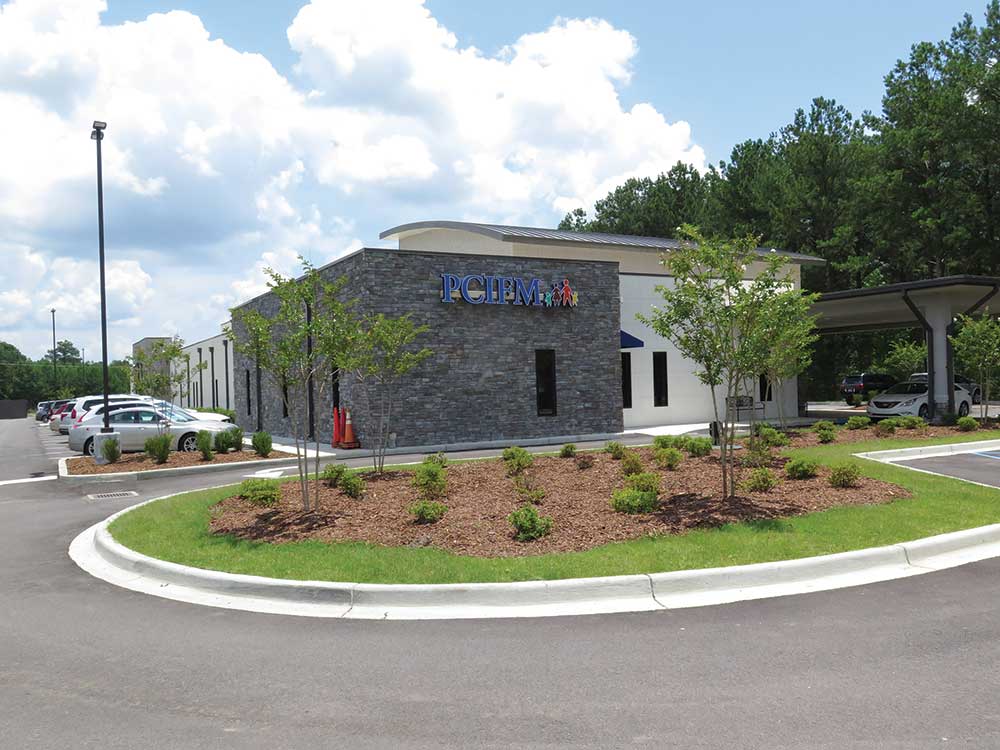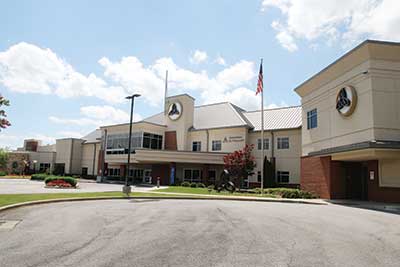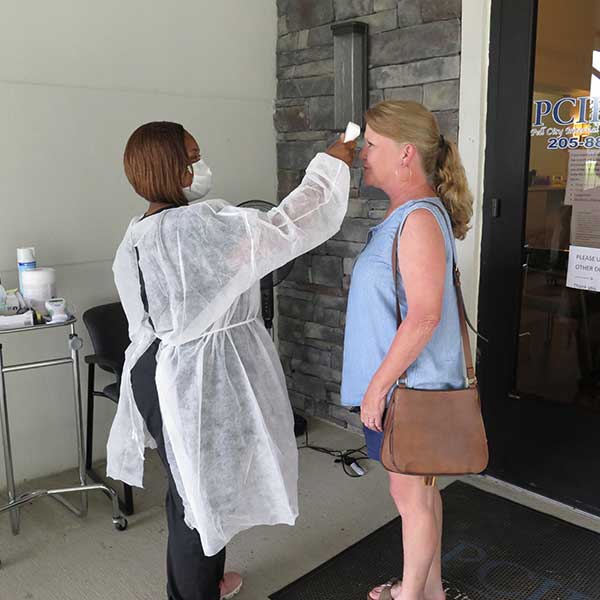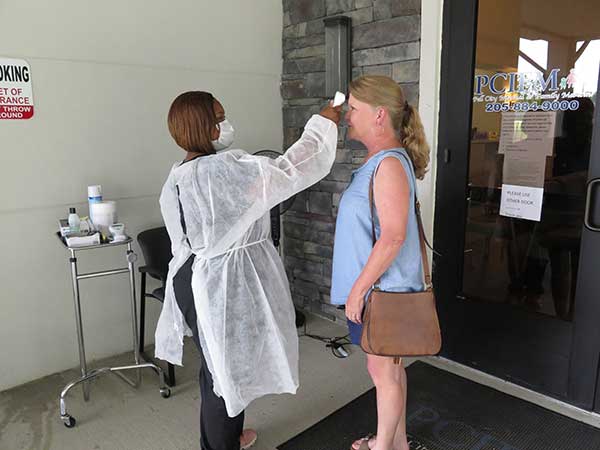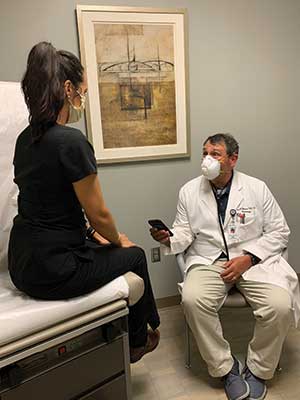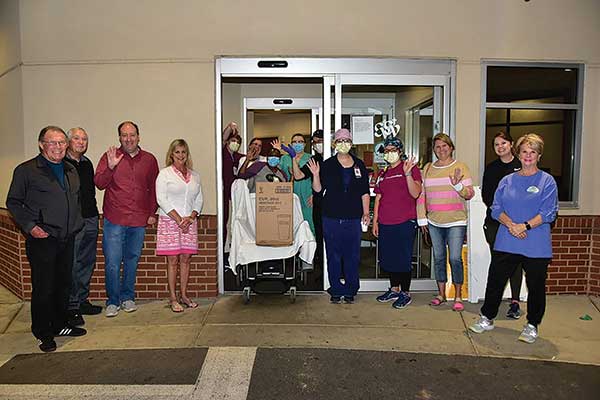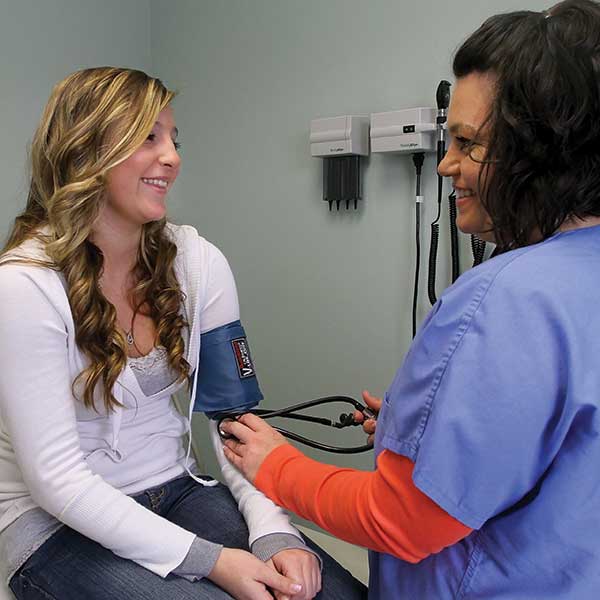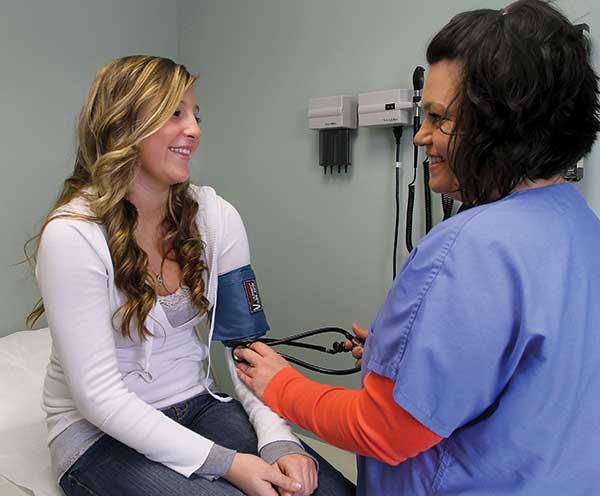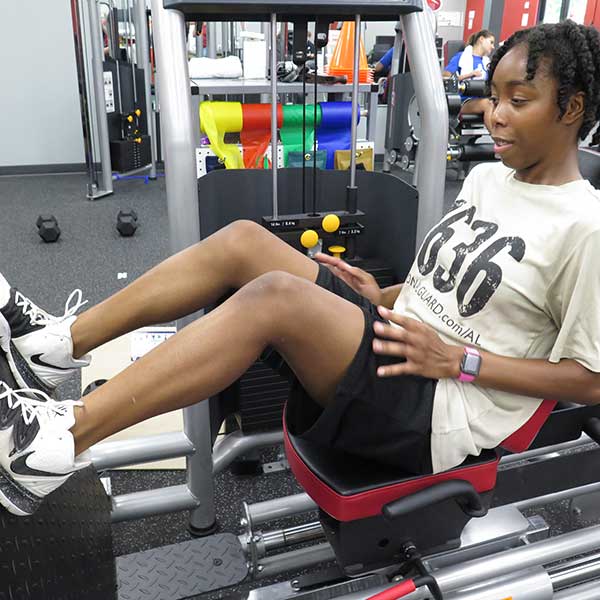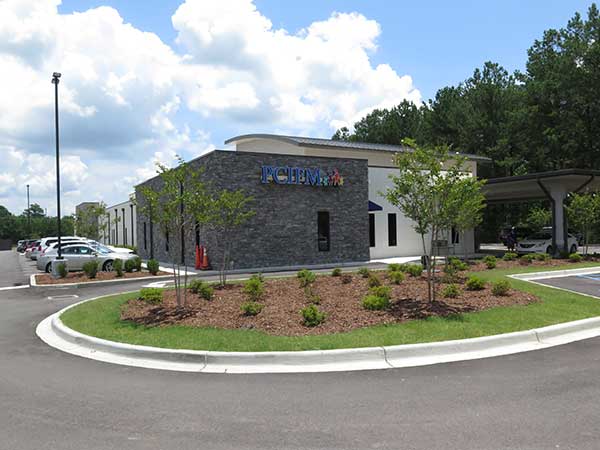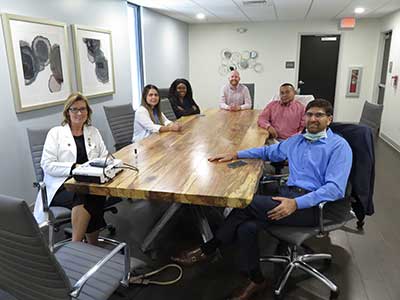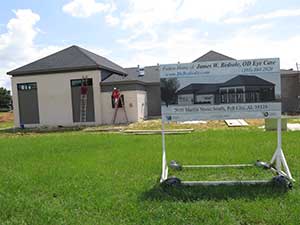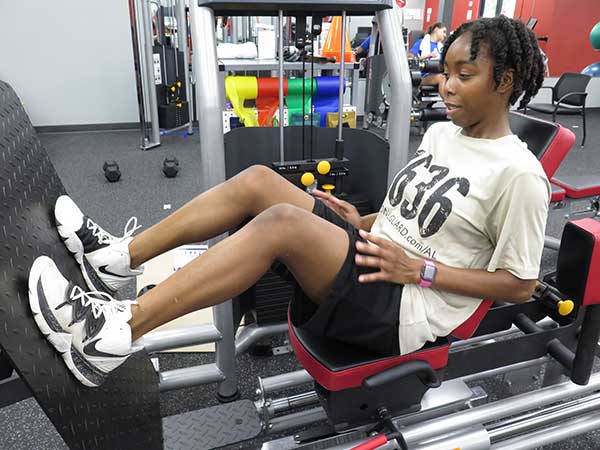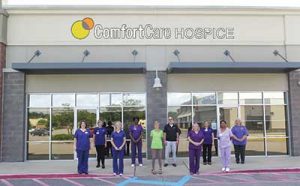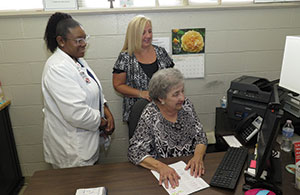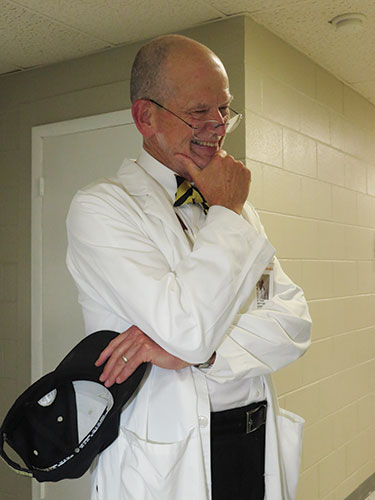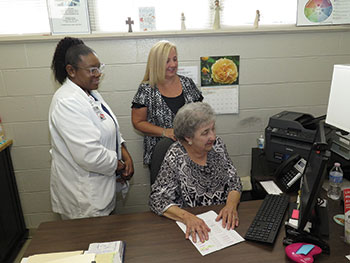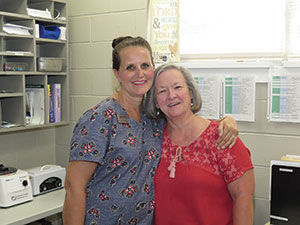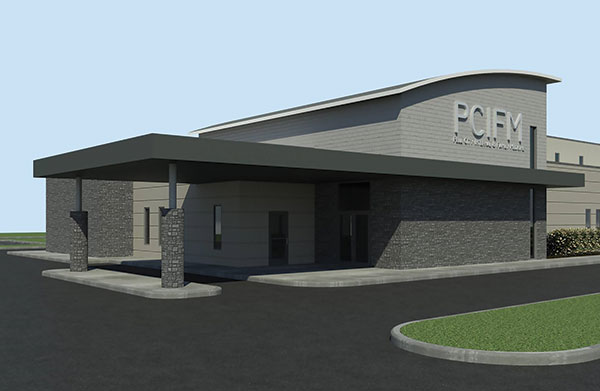Helping meet the needs of every patient
Story by Jackie Romine Walburn
Discover staff photos
St. Clair County medical practices are partnering with specialists from larger municipal area to bring specialty medicine – from cardiology to surgery to dermatology – closer to home.
“Having the specialists here in our office offers continuity of care for patients, plus convenience and familiarity,” says Pell City Internal and Family Medicine (PCIFM) office manager Terri Woods. “The response from patients is always positive.”
The specialists now seeing patients through PCIFM lease offices at the practice’s facility at 41 Emience Way in Pell City. When needed, the internal and family medicine physicians refer patients to specialists who bring staff and see patients in Pell City on a regular basis.
The medical specialties often needed by patients of Pell City’s internal and family medicine practices include cardiology, orthopedics, general surgery, gastroenterology, nephrology (kidney care), podiatry and dermatology.
Currently PCIFM has five medical specialists who see patients on referrals from the local practice. Each specialist’s offices schedule appointments and have medical staff who come to the Pell City offices.
Medical specialists now seeing patients in Pell City through PCIFM include:
Dr. Karl E. Hofammann III, an orthopedic surgeon who specializes in sports medicine, total joint replacement, hand and wrist surgery and general orthopedics. He practices at Orthosports Associates offices at Citizen’s Baptist Medical Center, St. Vincent’s East and Pell City Internal and Family Medicine.
Dr. Vinh Nyguyen, a general surgeon who focuses on areas and organs of the abdomen and related organs, specializes in invasive or minimally invasive surgical techniques with the latter reducing recovery time and stress on the patient’s body. He has offices in Birmingham, Oneonta and Pell City.
Dr. Raj Patel, a board-certified dermatologist trained in micrographic surgery and cutaneous oncology. A native of Shelby County, Dr. Patel is the only ACMS (American College of Mohs Surgery) fellowship trained in Mohs and reconstructive surgeon in Shelby and Chilton counties. Working with Truye Dermatology, Dr. Patel has offices in Alabaster, Birmingham, Clanton and in Pell City at the PCIFM.
Dr. Alvaro A. Aldana, a cardiologist with Grandview Medical Group. He specializes in intervention with coronary, renal and peripheral vascular disease and is board certified in internal medicine, cardiovascular disease and interventional cardiology. A native of Columbia, he earned his medical degree from Javeriana in Bogotá and completed a fellowship in general and interventional cardiology at St. Francis Hospital in Evanston, Ill. In addition to office hours at Pell City, he sees patients at Alabama Cardiovascular Group in Birmingham and Grandview Medical Group Primary Care and Cardiology Trussville.
Dr. Jay Long, a general surgeon specializing in bariatrics, who sees patients at Birmingham Minimally Invasive Surgery (BMI.com) in Birmingham. Associated with St. Vincent’s East and St. Vincent’s St. Clair, Grandview and PCIFM in Pell City, he provides a one-on-one consultation with all patients to begin their weight-loss journey. He and a multidisciplinary team offers support before and after any surgery with monthly support meetings, nutrition classes and customized high-protein diets.
At Northside Medical Associates, which becomes “Complete Health – Pell City” at the end of August, having specialists on site “helps ensure that the care patients need is convenient, even when being sick is not,” says Clay Barnett, corporate communications manager for Complete Health. It is a primary care medical group Northside joined in October of 2020.
“We strive for easy access and having these groups on our campus certainly makes that a simpler task, especially for our patients who might not be comfortable driving into metro-Birmingham to an intimidating hospital setting,” Barnett adds.
He noted that since Northside joined forces with Birmingham Internal Medicine Associates (BIMA) and Complete Health the group has become the Birmingham area’s leading primary care group. The addition of medical specialists, who lease office space at Northside’s 80,000-square-foot campus on Plaza Drive, complements Northside’s existing state-of-the-art imaging, on-site pharmacy and a 365-day-per-year Urgent Care center serving the people of St. Clair County. The Northside medical practice, founded in 2001 with three physicians, has grown to more than 150 care providers and staff in four medical offices, including Moody, Springville and Trussville.
Northside has more than 12 specialist physicians and practices seeing patients at Pell City offices, says Shelley Gallup, clinical services manager for the practice. The specialist groups lease space within the Pell City facility and respond to referrals from Northside’s 12 physicians and 16 nurse practitioners but are not directly affiliated with Complete Health.
Offering expertise in medical specialties including obstetrics and gynecology, ear, nose and throat, oncology, cardiology, ophthalmology, general surgery, gastroenterology, orthopedics, dermatology, nephrology and podiatry.
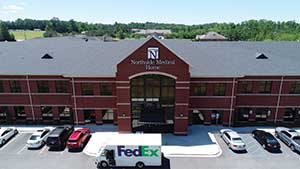
Now seeing patients in Pell City via Northside and Complete Health are specialists:
Dr. Lewis Schulman, an OB/GYN physician with Grandview Medical Group, who specializes in obstetrical and gynecological care, urinary incontinence management, contraceptive options and hormone therapy.
Dr. Julie Taylor, a board-certified physician in obstetrics and gynecology with Ob-Gyn South and on staff at Brookwood Medical Center and St. Vincent’s St. Clair. Specialties include adolescent medicine, high-risk obstetrics and robotic surgery.
Dr. Justin Aldred, an obstetrician and gynecologist with Ob-Gyn South, has specialties including high-risk obstetrics, laparoscopic/robotic surgery and urinary incontinence.
Dr. Stephen Favrot, an otologist with ENT Associates, treats otologic and general otolaryngologic disorders. His areas of interest include treatment of hearing loss and balance disorders and of tumors of the skull base. He treats children and adults, including cochlear implantation and the bone anchored hearing aid (BAHA).
Dr. E. Scott Elledge, an otolaryngologist with ENT Associates, specializes in head and neck surgery, pediatric ENT, nasal and sinus disorders and allergies.
Cardiologists with Birmingham Heart Clinic in Birmingham specialize in treating coronary, carotid and peripheral disease with minimally invasive procedures to repair aortic aneurysms (PEVAR), replace aortic valves (TAVR) and transcarotid artery revascularization.
Surgeons from Eastern Surgical Associates of Birmingham specialize in minimally invasive laparoscopic and robotic surgery and operations in the areas of oncology, endocrinology, gastrointestinal disorders and vascular disorders.
Vision First Eye Center is a full-service eye care facility owned by Dr. Mark Bearman and Dr. Mark Mclintock. Vision First’s Pell City office at 74 Plaza Drive, specializes in laser cataract surgery and iDesign guided iLASIK surgery.














